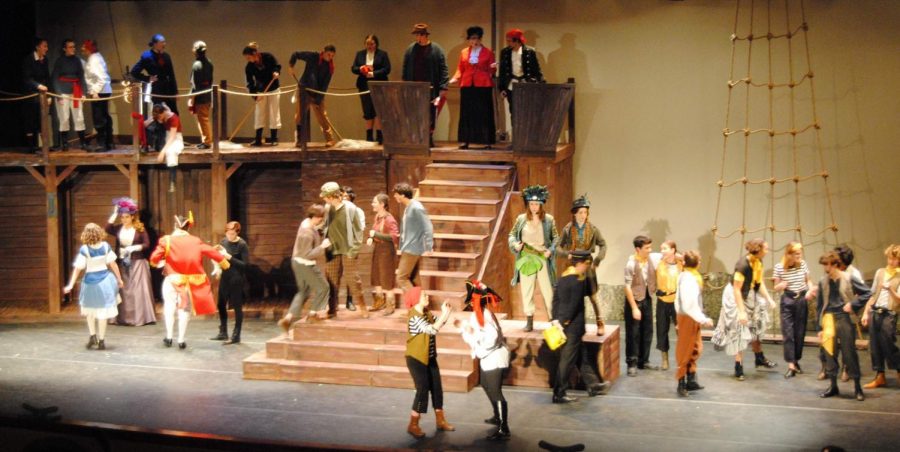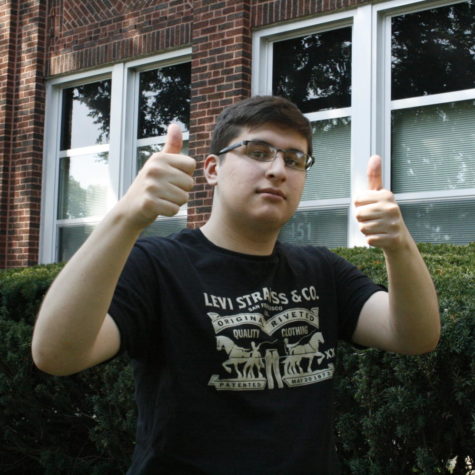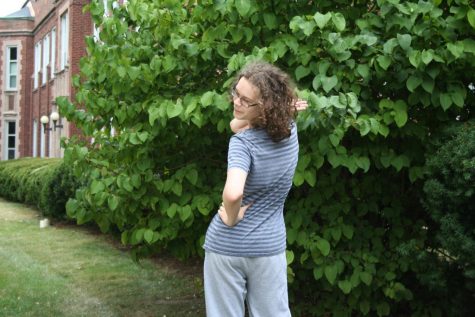Dialect coach helps actors find their voice
The cast of RB’s production of Peter and the Starcatcher takes the stage
November 14, 2019
Annually, Director Colleen Stahnke rallies together a group of students to put on the RBHS fall play. This year, due to the tricky British accents used in the script, Juliet Boyd volunteered as a dialect coach for the aspiring young actors in the production of Peter and the Starcatcher.
Peter and the Starcatcher is a prequel to the story of Peter Pan, a story of a boy who lived on the magical island of Neverland. The play tells how he ended up on the island in the first place and how he learned to fly. As many of the characters in this play are English, they speak in a standard British dialect. Boyd was an amazing help to those actors taking on the accents.
“It was easy to teach them,” Boyd said, “They were all engaged.”
While she is not a professional dialect coach, Boyd has helped the actors with learning, not only the way to properly use the accent, but also the meaning behind the phrases they were using. She thinks that even though it could have been difficult working with the large cast, they were ready and willing to work toward perfecting their accent.
“There are lots of jokes in the language so it’s not like how you would say a normal sentence. These are intentionally punny or alliteration. Plus, Ms. S wants you to say it in an accent. Then, you’ve got to try and convey the meaning,” explained Boyd, “Because it isn’t a naturally easy thing.”
It was no easy feat for Boyd to teach all of these kids to speak in the British dialect demanded by the script. Some characters had different voices that required their own special diction. Characters like Molly Aster and Lord Aster had proper British accents, however, a character like Black Stache the Pirate, spoke more like a sailor and gave off more of a rogue vibe.
“There were two kinds of accents they wanted: you have the Molly Aster, proper British accent, and Captain Scott, and Lord Aster which is much more proper. But then they had what I call the ‘piratey’ accents as well. Black Stache, for example, he speaks in a much more ‘East end’ accent,” Boyd said.
Boyd helped the actors out six times over a two month period, putting in numerous hours of coaching during those days. She initially taught the cast just the basics, then began to split up into separate groups based on the different characters (leads, pirates, etc). She had quite a few ways to get the dialect through to them. In the beginning, she tutored them on how different letters are pronounced in alternative ways (as in R being pronounced as “ah”). Next, she had the actors partake in a speaking session with each other that utilized what they learned, and helped integrate it into their speech patterns. Boyd would sometimes even send the actors home with homework to listen to things like the British Broadcasting Channel to hear standard British speech.
“These kids are so talented, and you give them a few tools, and they just go for it,” Boyd said, “Some of them are mimics and they would follow along with me and get it that way, they have an ear. A lot of the kids that are in this cast do music and singing, so it was a much easier thing particularly for those kids.”
The only experience she had under her belt was giving her daughter a few tips on her dialect in a middle school play. Despite that, she still was able to work with the actors on their dialect, and eventually got to the point where she was proud of the work she and the actors put in.
“Now they’ve gotten to that next level, where they know the dialogue, which is hard, they can speak it in an accent, and they are conveying the meaning,” Boyd said, “Whether you’ve been a kid who’s been acting (try this web-site) for your whole life or you’re trying it out for the first time this is a really wonderful, supportive group of kids, so you should try out.”




